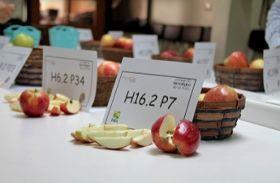
Chile’s Fruit Technology Consortium organised a field day at the Santa Rosa Experimental Center of the Agrofisheries Research Institute (INIA) Quilamapu in Chillán to enable producers to learn about recent developments in its apple breeding programme and sample some of the new varieties coming through.
The programme’s director and deputy directors, Paul Grau and Juan Pablo Zoffoli, updated companies on the progress of this long-term project, which is currently in its second phase running from 2014 to 2022. The US$3.3m programme is funded by the Fruit Technology Consortium in conjunction with Innova Chile and INIA.
“This programme began in 1995, and by 2022 we hope to have the first commercial apple varieties for the Chilean export industry,” said Grau.
So far three selections are at an advanced stage and are being grown in six locations: Requinoa, Molina, Villa Alegre, Chillán, Angol and Freire, Grau explained.
In addition to the apple project, the consortium runs breeding programmes for table grapes, stonefruit, cherries and raspberries, each designed to boost the competitiveness of Chilean fruit exports by developing varieties that satisfy the demands of consumers and are able to withstand the long journeys to target markets.
“Chile is committed to supporting innovation in a bid to reverse the sharp decline the country has experienced in competitiveness and innovation,” said Sergio Aravena of Chile’s Production Development Corporation (Corfo). “Since 2009 there has been a fall in state contributions to research and development and as a result Chile has fallen in international rankings of competitiveness and innovation.”



